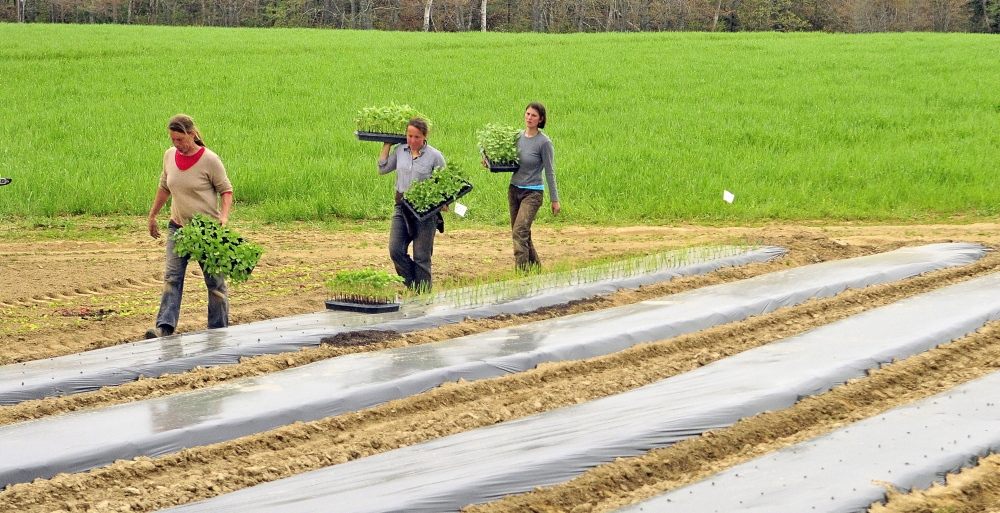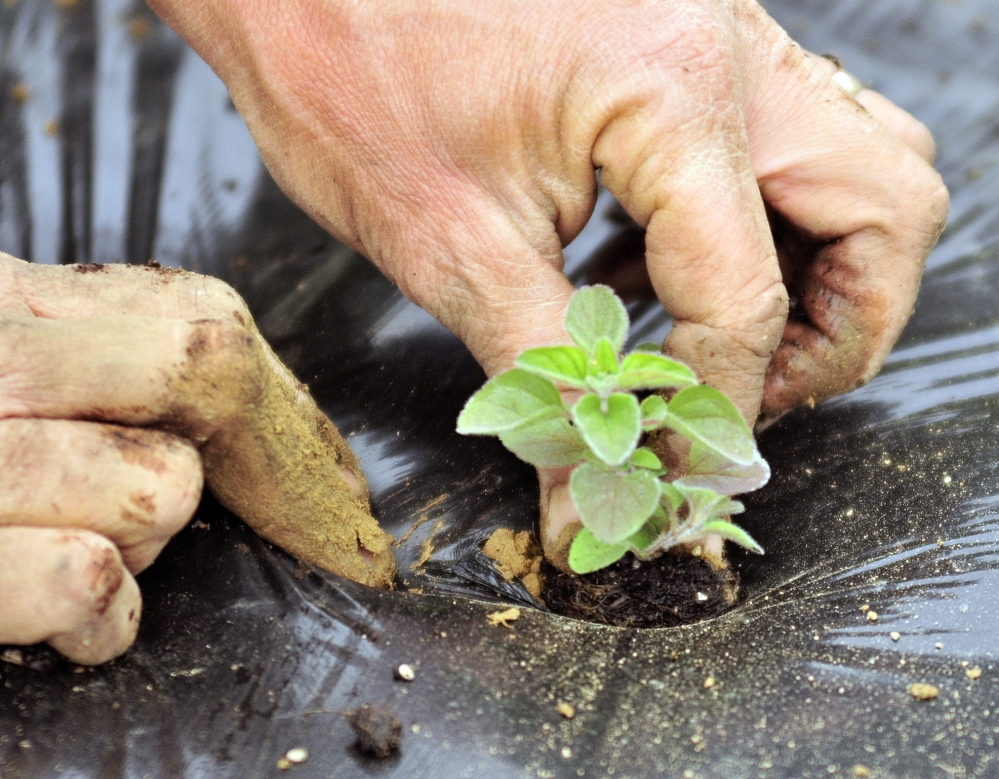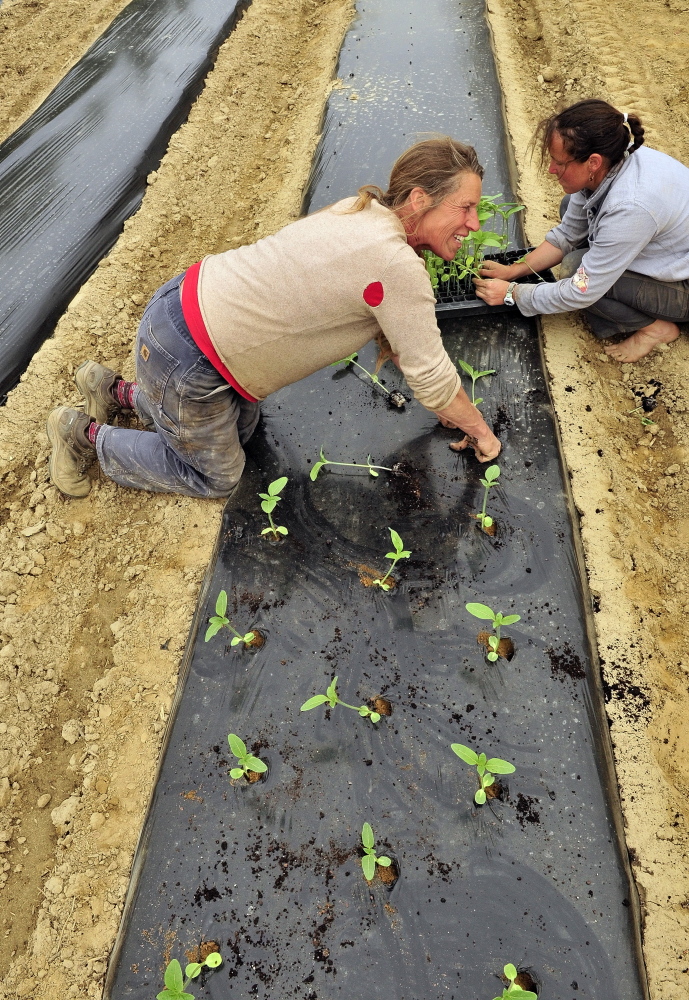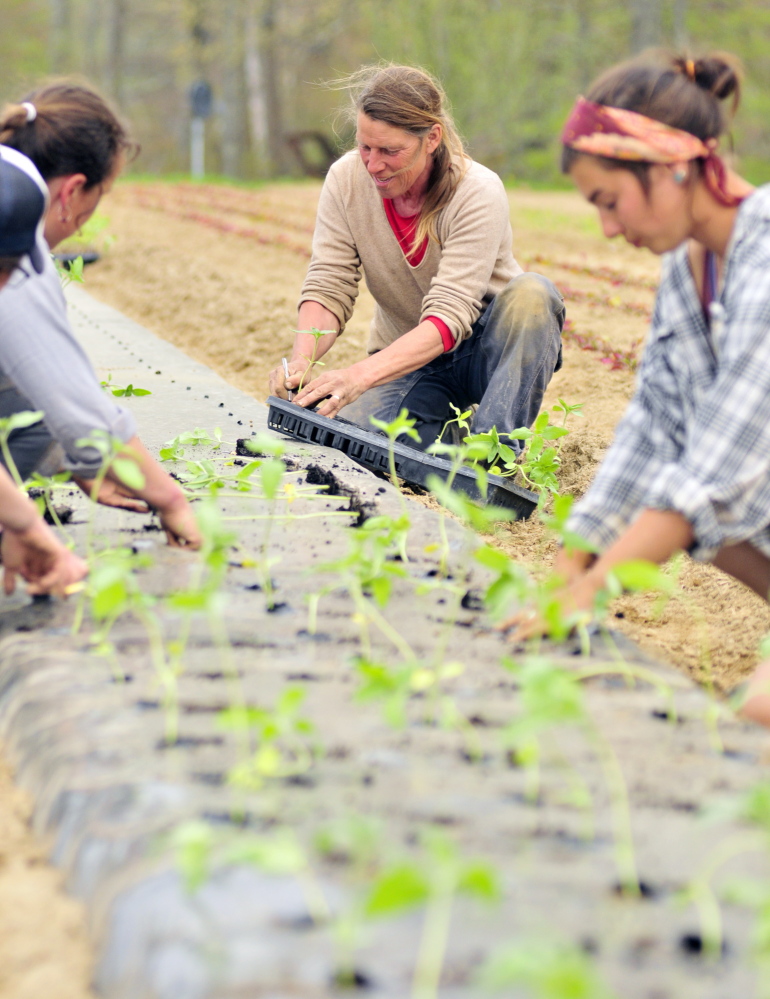The number of farms across the United States with community-supported agriculture (CSA) programs remained essentially flat between 2007 and 2012, but in Maine it was a very different story. Here, that number increased more than 150 percent, from 159 to 406, according to U.S. Department of Agriculture census data released last month.
Throughout the country, the number increased less than 1 percent, with the total number of farms reporting CSA shares hovering at 12,600. New England as a whole saw its CSA numbers increase by more than 110 percent.
Agricultural experts in the state attribute the growth of CSAs here to an overall increase in the availability of and demand for local food.
Community-supported agriculture programs, informally called CSAs, allow farmers to earn income when they most need it – before crops are even planted (let alone harvested). People pay up front for the promise of produce, or other products, in the future.
Traditionally, come spring a CSA member starts picking up a box of produce each week at the farm or an agreed-upon, central spot, perhaps a church or a member’s front porch. The contents of the box are determined by the farmer.
The number of smaller vegetable farms, which make up the vast majority of farms that offer CSAs, also increased in Maine between 2007 and 2012, so it makes sense that the number of farms that operate CSAs increased, said John Harker, director of marketing development at the Maine Department of Agriculture, Conservation and Forestry. According to the census data, the number of farms in Maine growing vegetables, excluding potato farms, jumped by nearly half between 2007 and 2012 – from 504 to 732. The total acreage of vegetable farmland increased by just 9 percent in that period.
Because of the operational advantages of getting money ahead of time, farmers are aggressively promoting CSAs, said Ellis Additon, director of the Maine Bureau of Agriculture, Food and Rural Resources in the department. They are doing so in part by shifting away from the traditional CSA model.
Instead of prescribed boxes, many are selling shares that are future credit that can be used at a farm stand or the farm’s table at farmers markets. With this arrangement, members can pick out for themselves the fruit and vegetables they most like to eat.
Farmers who run these credit CSAs typically offer incentives, such as extra purchasing power for paying early or for buying multiple shares.
Fail Better Farm in Etna, for instance, offers people 5 percent extra if they buy two or more shares of $100 of credit, 10 percent extra for five or more and 15 percent extra for 10 or more.
HOME DELIVERY FOR SOME
A few farmers, like Kevin Leavitt of Farmer Kev’s Organic in Winthrop, incentivize CSAs by delivering the vegetables door-to-door. His CSA has grown from 10 members in 2010 to more than 100 today.
“We’d rather have a product already sold through the share rather than grow on speculation of what people say they’ll buy,” Leavitt said.
Another development is that more farms – and other businesses – are using the CSA model for items other than vegetables. Farms have added flower and herb CSAs, while coffee shops, breweries and pie bakers, to name a few, have begun selling shares of their products upfront. The nation’s first community-supported fishery (CSF) was started in Port Clyde in 2007, and an oyster CSA is in the works..
What else accounts for the phenomenal growth of CSAs in Maine? Consumers have gotten more accustomed to paying in advance, Harker thinks, while farmers have become more adept at meeting the needs of consumers.
Clayton Carter, the owner of Fail Better Farm, started selling box shares in 2008.
“As a couple of years went on, I found it harder and harder to sell those type of shares,” he said. It wasn’t easy to find customers committed enough to travel to the farm – nearly 20 miles west of Bangor – every week to pick up boxes of produce.
Now that Carter sells shares of $100 credit that customers can spend at any of the farmers markets he attends – in Waterville, Orono or Bangor – he’s found a model that “fit us better and fit our market customers better.”
CREDIT SHARE PIONEERS
On a mid-May morning, Jan Goranson was driving a Kubota tractor up and down a field at her farm in Dresden, seeding spinach crops. She won’t be earning any revenue on the crop for weeks, but some of her customers have already paid her.
Goranson and her husband, Rob Johanson, have operated a credit-style CSA program on their 160-acre vegetable farm since 1991, making it one of the oldest CSAs in the state.
“Back in 1991, CSAs hardly existed,” Goranson said. She and her husband figured that their country neighbors probably grew vegetables in their own gardens, so a more flexible approach made sense. “We didn’t want to scare anybody away,” Goranson said, “so that’s why we decided to do (a credit share CSA). It worked so well for our farm and farm stands that we extended it to our farmers markets.”
Until recently, Goranson Farm offered a winter CSA in the box form, but the couple now promote a credit-style system for winter, too. The summer CSA has close to 300 customers; in winter, they cap the number of box shares to about 100, Goranson said.
For small farmers, CSAs offer many advantages.
“The whole idea is to get cash early in the season,” said Tom Roberts, who with his wife Lois Labbe has operated a CSA for about 15 years at Snakeroot Farm in Pittsfield. “We’re buying seeds and potting soil and diesel for the tractors, and hiring people to work at the farm. It’s all cash out and no cash in. It’s a terrible cash-flow situation.”
‘SHARING THE RISK’
For Broadturn Farm in Scarborough, which offers both a vegetable and a flower CSA, the model promotes efficiency, said Stacy Brenner, who owns the farm with her husband, John Bliss. The couple plant what they need to fill their CSA orders, selling any extra at their farm stand, to restaurants or to Aurora Provisions, a gourmet market and cafe in Portland.
“Essentially they’re sharing the risk,” Brenner said. “If we have a hard year, and we don’t have many winter squash, we all share that together. And if we have a bountiful year with tomatoes, people get to can more tomatoes.”
Because of the CSA he runs, Carter can rely less on credit cards at the start of each season, and he can build relationships with customers.
“My customers aren’t just business transactions,” he said. “At the end of the season, they’re almost friends. I see them regularly. I know their names. I know their kids’ names. Sometimes I know their dogs’ names.
“I recognize that, although (CSAs are) gaining in popularity, it’s still kind of unique to be giving this random person, dressed in dirty Carhartts sometimes, a check for 500 bucks,” he continued. “There’s a certain role trust has in that.”
Contact Paul Koenig at 621-5663 or:
pkoenig@centralmaine.com
Twitter: @paul_koenig
Send questions/comments to the editors.








Success. Please wait for the page to reload. If the page does not reload within 5 seconds, please refresh the page.
Enter your email and password to access comments.
Hi, to comment on stories you must . This profile is in addition to your subscription and website login.
Already have a commenting profile? .
Invalid username/password.
Please check your email to confirm and complete your registration.
Only subscribers are eligible to post comments. Please subscribe or login first for digital access. Here’s why.
Use the form below to reset your password. When you've submitted your account email, we will send an email with a reset code.